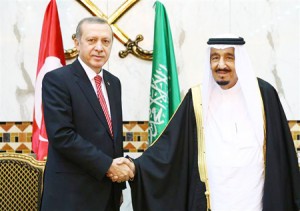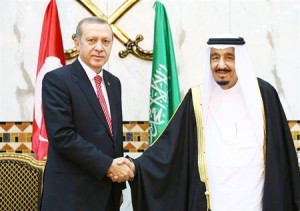Financial Times
Simeon Kerr | Mehul Srivastava
 The US is seeking to rein in its allies Turkey and Saudi Arabia from military action in Syria if a ceasefire planned for today in the bloody civil war fails.
The US is seeking to rein in its allies Turkey and Saudi Arabia from military action in Syria if a ceasefire planned for today in the bloody civil war fails.
Despite mounting regional frustration over Washington’s allegedly passive stance on the five-year-old conflict the Obama administration and other western powers are worried that direct military interventions could lead to an escalation of the conflict and a dangerous clash with Russia.
“Are they going to deploy troops there? Not if we can help it,” said one senior Nato diplomat.
While Ankara and Riyadh are deeply wary of acting without US consent, both are angry at what they see as US failure to take a more muscular stance against Moscow’s campaign to support the regime of Bashar al-Assad.
Turkey, according to two senior western diplomats, wants to create a buffer zone across its border “several kilometres deep” that would allow Ankara to check the expansion of the Kurdish militias in Syria that are its primary concern.
Such a move would also provide potential breathing space to moderate Syrian opposition groups further south, currently under heavy attack from Russia and Mr Assad’s forces.
Several senior moderate rebel leaders have met military officials in Ankara and Istanbul in recent days, Syrian opposition groups said, to work through plans for a potential “Islamic coalition” deploying in the north.
For much of Nato, the prospect of a member state deploying troops into an already congested theatre in which Russian forces are actively involved is a deeply unsettling prospect.
“Syria is spiralling out of control,” says Charles Lister, resident fellow at the Middle East Institute, a think-tank. “The situation in northern Syria has the potential to transform the trajectory of the entire Syrian crisis.”
Turkey is thought unlikely to intervene directly without US consent. But it continues to funnel Syrian rebels through its territory onto the battleground: on Thursday night several hundred fighters crossed the border close to Kurdish held areas, Syrian-based activists said.
Meanwhile, Saudi Arabia is concerned it is rapidly losing influence over the Syrian civil war and scope to influence any subsequent peace talks, as the leverage of its regional arch-rival, Iran, grows by the day.
One regional diplomat said Riyadh views the deployment of force as a precondition of maintaining influence not just in Syria but also in Washington. In a clear signal to Iran, the Kingdom unveiled a 34-strong “military alliance” of Muslim nations in December. It has also just begun unprecedented military exercises that involve some 20 other countries, including the Arab Gulf states, Sudan, Egypt, Morocco, Jordan, Nigeria, Pakistan and Malaysia.
Some officials say the Saudis are considering the option of an operation in Syria’s south east — near the border with Jordan — rather than the more heavily contested north, possibly accompanying Jordanian forces.
According to senior Saudi officials, Jordan proposed deploying special forces near the al-Tanf crossing last year. Syrian tribal leaders in eastern Syria said the Saudis have already conducted reconnaissance missions in the area. Publicly, Saudi Arabia follows Washington’s lead. Adel al-Jubeir, Saudi foreign minister, has said any potential move to insert Saudi and UAE special forces into the Syrian conflict would have to come under the umbrella of a US-led operation.
Pentagon press secretary Peter Cook said on Tuesday that “[the US] will be keeping a close eye” on the ceasefire, and who abides by it, ready to “respond, if necessary”.
Washington is in any case planning to increase operations in Syria against Isis in the coming months. US defence officials say the White House has already agreed to support a “significant” increase in US special operations forces.
The flow of weapons to moderate fighters could also be increased. In the weeks after Russia’s intervention last September, observers reported a sharp rise in anti-tank missiles used by the rebels, which helped them resist a regime offensive. Rebels say further weapons are now coming in, including mortars and more advanced missiles.
“Making Russia pay a high price is the key to this, but it’s hard to say how we could do that,” said one senior European politician, as he confessed scepticism over the proposed armistice. “It’s not a ceasefire,” he said of the deal due to be implemented on Friday. “It’s not clear what it is.” For many countries involved, the doubts about the ceasefire only reinforce the need for a plan B. Asked at the same conference whether he thought the ceasefire would work, another politician – a foreign minister – just laughed.j



